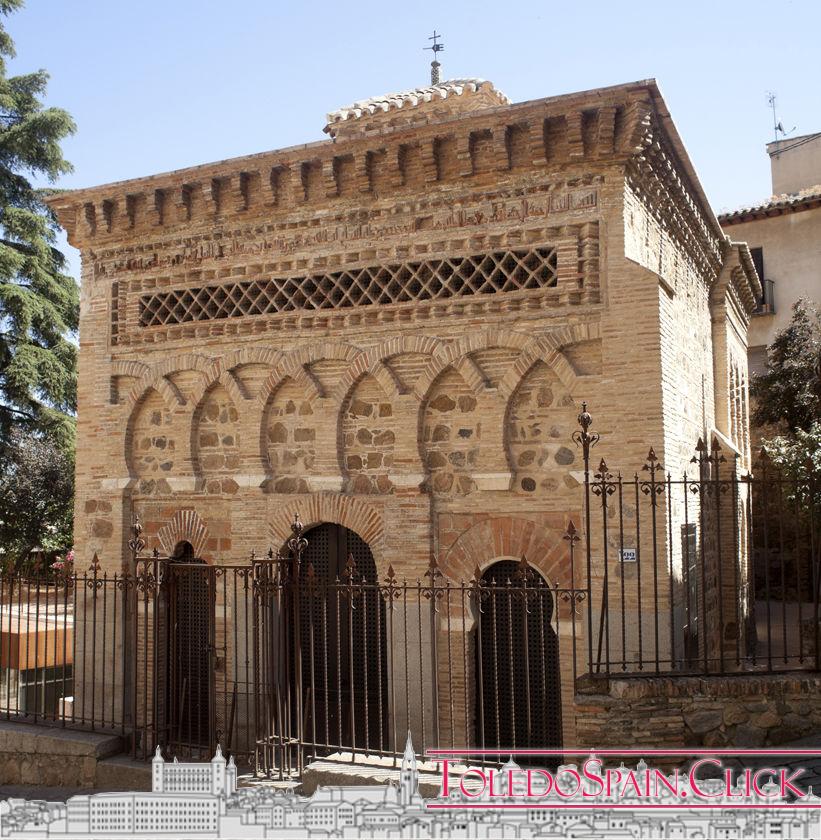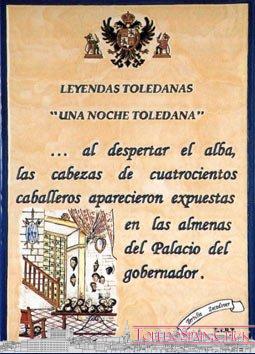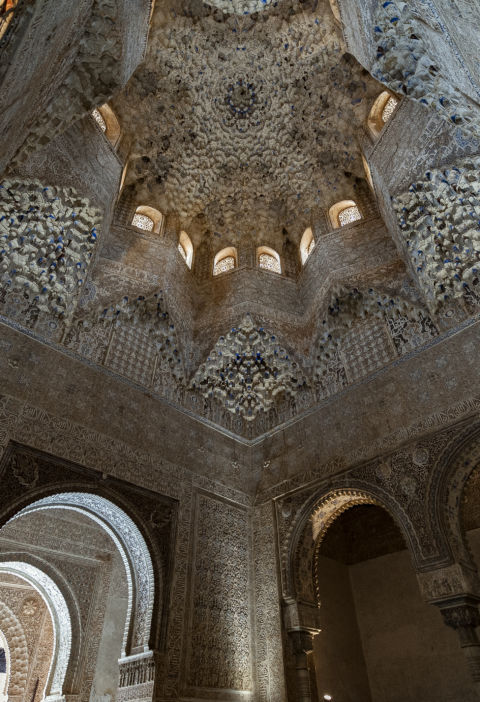The Legend of the Palaces of Galiana, or of Galiana, is a set of diverse stories, which all start from a beautiful blackberry that “dazzles” every Christian who sees it. In this case, we offer two of the best known (in a “reduced” version). As in any good legend, surely the reader knows some version different from those described here…
It is said that the Infanta Mora Galiana was a beautiful young woman, with melancholic eyes, black hair and eyes and shiny as the jet and velvety complexion. It was said of her:
” Galiana de Toledo / muy hermosa a maravilla / la mora más celebrada / de toda la morería”
Index of Contents
Current Galiana Palace
The so-called “Palacio de Galiana” at present. Photo: Felperea on flickr
He lived in these palaces of the Toledo citadel surrounded by all the refinements of luxury, all the comforts and pleasures that his father, King Galafre, could give him; however, he lacked the primordial thing: authentic love.
One summer night, two shadows sat on the cool grass of the palace garden, both in white floating robes. It was Galiana, who could not sleep, and her maiden Geloria. The young princess occasionally raised her eyes to the star-studded sky and sighed. Then the maiden, sitting next to her, asked her about her afflictions. How could she, who possessed everything, be so sad? Galiana replied full of melancholy that although it was true that she lacked nothing, she felt within her soul like an emptiness that prevented her from being totally happy.
Geloria, more adept at the ideas of life, replied that this emptiness could only be filled with “love” ; but how could she, who was loved and corresponded to Abenzaide, governor of Guadalajara, be lacking in love? To this reflection the Infanta looked sadly at the opposite side of her slave so that she would not see the tears that were beginning to slide on her cheeks and, soon, she opened her lips to be sincere with her maiden and friend and declare to her that she did not love Abenzaide. She recognized his power, strength and courage; she recognized that he loved her with delirium; but she, on the contrary, hated him because she knew him brusque, haughty and dominant. And the princess concluded:
-I know that tomorrow will come, for he has already announced his coming, and I am ready to tell him not to come again and bother me with his compliments.
The echo of these words had not yet been extinguished when, from behind some bushes, appeared the figure of a gentleman dressed in a Christian suit who fell at the feet of the Infanta Mora, who uttered a cry of terror, narrowing against her slave who was as frightened as she was.
It was the young prince Charlemagne, the future Charlemagne, who had just arrived at the court of the Moorish king of Toledo.
They said that to bring a mission that his father had entrusted to him by the king of France, Pipino the Brief, although he confessed to Galiana that same night that he had come moved by the fame of her beauty and that he had fallen in love with her as mad as quickly. He went on to tell her that he dared now to tell her all this, after listening to her words, because while he believed that he loved Abenzaide he did not dare to show her his feelings out of respect for her and her father, who had welcomed him so well.
I’m sure you’re also interested: The Alley of the Just Judge
The strong heartbeats which out of fear had altered Galiana’s heart, now turned into palpitations of joy, for she had also noticed the handsome and hardened Christian prince and, without realizing it too much, love had begun to nest in his heart. But greater was his joy, which his eyes could not conceal, when he proposed to change the gardens of Toledo for those of France.
To this proposal, the young and beautiful princess answered with a weak yes, while hiding her face, dyed with blush, in the chest of her favorite slave.
Everything wonderful and pleasant that night was for lovers, was unfortunate and painful the next day. On that day Abenzaide arrived, who had come with the sole purpose of hearing from Galiana and her father Galafre the definitive date of their marriage, since previously he had only received evasions.
When Abenzaide wanted to see the princess, only his slave Geloria appeared before him, who told him that his mistress did not want to see him and that she begged him not to bother her again nor to disturb the calm of her gardens and chambers, because she did not love him.
The proud governor of Guadalajara was dumbfounded to hear those words. It was not possible, I could not believe that they were addressed to him. Geloria disappeared in the rooms of the infanta mora closing the door behind him and Abenzaide was paralyzed, remaining for a long time in the same position, dark and thoughtful. Suddenly, he laughed, came to himself and, shouting an imposing cry of anger and pain, he walked away. He went to see Galafre, to whom he gave his complaints, and then he rode his mare and, accompanied by his lieutenant Hassam, he left, angry and with a great desire for revenge, for Guadalajara.
Palace of Galiana
Galiana Palace in Toledo. Photo: felperea at flickr.com
When Galafre was faced with two wedding requests for his daughter, one from Abenzaide and the other from Charlemagne, he found himself in a serious dilemma. On the one hand it was profitable for him to be in good health with the powerful king of France and on the other it was not convenient for him to rebuff the proud governor of Guadalajara, who, besides being of his race, was a neighbor and with marriage the limits of the kingdom of Toledo could be widened and border confrontations avoided.
He consulted astrologers and muftis, who, looking at the ancient laws, advised him that the most convenient thing was for the two rivals to face each other in a tournament to the death, where they would dispute the hand of their daughter. Galafre was favored with this solution, because the two lovers of his daughter also asked him so, since each one trusted in his ability and dexterity.
In an esplanade on the outskirts of Toledo, the camp was prepared. A tribune was set up to house Galafre, his daughter and the principals of the agarena court and, on a hot morning in July, the confrontation took place.
The crowd occupied the surroundings from very early, full of emotion, animation and joy and, against all expectations, all the sympathies were with the Christian gentleman.
Abenzaide was hated by all who knew him, for his cruelty. His fierce character had earned him the hatred of his neighbors and vassals.
On the contrary, Charles was young, beautiful and, most importantly, everyone knew that Galiana loved him and the princess was very much loved in Toledo for her beauty and kindness, which made everyone want the triumph of the French prince.
Father and daughter took the stand. It reflected in her eyes the pain and fear that the possible death of her beloved caused her, who was going to fight to free her from the abhorred Abenzaide. Galafre, who knew his daughter’s inclination, was also extremely worried.
Everything was ready and in order. The two adversaries clad in their richest armor, facing each other, mounted on their spirited steeds that caracoleaban nervously and wielding their weapons. At a sign from Galafre the combat began at the same time that Galiana closed her eyes not to see the fierce fight.
The first crash was tremendous. The spears were split and horses and knights, melted into a mass, disappeared into a thick cloud of dust, while the cheers of the spectators thundered the atmosphere. After a period of time that became eternal, the dust began to dissipate and the figure of one of the contenders was glimpsed standing, carrying a sword in his right hand.
It was Carlos, who had defeated his enemy, who lay at his feet, having pierced his heart with a sure blow.
Galiana, who remained with her eyes covered, opened them, while her face reflected a great joy, when she heard the crowd applauding and chanting the name of her beloved, as a sign of victory.
A few days later the two lovers left for Gaul, accompanied by Bishop Cixila, who would baptize the Moorish princess, who converted to Christianity, and then celebrate the betrothal between Charlemagne and Galiana in French territory.
When Pipino the Brief died, his son Charlemagne inherited the throne, married to the Toledo princess Galiana, who had five children, were the founders of the Western Empire and the first monarchs of the Carolingian dynasty.
Among his sons, the most famous was Ludovico Pio, founder of the county of Catalonia and heir to the crown at the death of his father.
Some authors point out the end of this historic legend that once, Alfonso VI, before conquering Toledo, visited the palaces of Galiana and, strolling through the courtyard he was seen in the company of the ghost of Abenzaide, who suggested how to conquer the city… This was the revenge of the Governor of Guadalajara.
Another version of this legend tells us that Charlemagne arrived in Toledo fleeing from his persecutors in France and took refuge in the kingdom of Galafre, who gave him refuge and welcomed him pleasantly. That later he fell in love with Galiana, which corresponded to him and both lovers decided, when the danger had passed in France, to flee Toledo surreptitiously and, despite the fact that the Moorish king of Toledo sent troops to persecute them, he could not prevent them from reaching their destination. The one who wrote this story reproaches Charlemagne for his bad behaviour and the bad payment he gave to the one who had taken him in unselfishly.
They can also be located in these palaces, which are not, as many believe, in the current area, next to the river, near the current train station, but in the area now occupied by the museum of Santa Cruz, which goes from the “Arco de la Sangre” (Blood Arch) to the miradero (lookout point).
They were vast palaces that formed part of the Arabic “alficén” that the city had. A group of sumptuous palaces that little by little have been lost.







